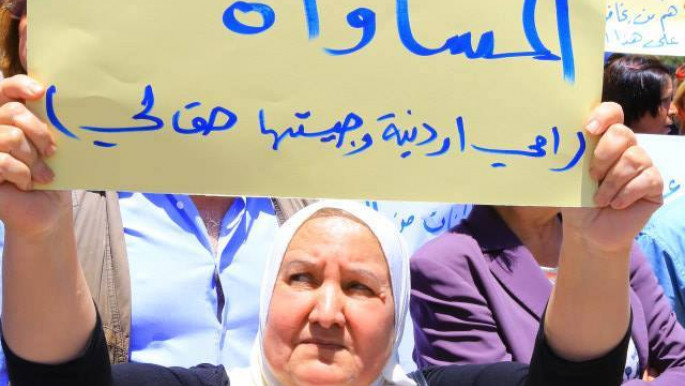
Habashneh: A tireless campaigner and an example to all
Last week, Jordan lost one of its foremost human rights activists.
Nimat Habashneh was 56 when she lost her battle with a cancer that had been diagnosed late. But it was another battle that defined her life.
In 2006, Nimat lost her Moroccan husband. Not long after, her daughter was refused medical care because she had no Jordanian ID. It was, she would later tell friends, a moment she could never forget: that feeling of inferiority because
| Don’t stop. You are the only ones who can get your rights. |
she had married a foreigner, and as a woman, could not pass down her nationality. As a result, her children could not obtain their rights.
It ignited something in her. She transformed her own personal tragedy and struggle into a national one. First, she reached out to other women in the same position. Then she asked them to unite around fighting a discriminatory law, that granted Jordanian men a right – to pass on their Jordanian citizenship to their children regardless of the nationality of their wives – that was not granted to women.
She founded a campaign – "My mother is Jordanian and her nationality is right for me" – and took to social media with vigour. In a matter of months after it was started in 2009, the campaign’s Facebook page garnered over 10,000 likes.
It took a while, but gradually the campaign gained traction, attracted more attention and was debated in policy-making circles. In November of last year, something tangible finally happened. The government announced that it would grant some basic rights to children of foreign men. These include free education, free healthcare and the right to work in some jobs previously restricted to Jordanian nationals.
They would also be allowed to invest, own property, secure a private driver’s license and be granted a special national ID. According to Hussein Majali, the interior minister, 355,923 children of 88,983 mothers stood to benefit.
It was not enough, but it was major progress. Nimat described it as a “historical milestone for Jordan”. To her it represented an “explicit recognition” of the rights of Jordanian women
 |
|
| Habashneh campaigning: 'We demand full, equal rights' |
Full-fledged citizenship remained – and remains – a distant prospect, however, and Nimat knew it. While from activists’ perspective this is a matter of gender inequality that contradicts Article 6 of the Jordanian Basic Law, for the government it is a political and demographic issue. Abdullah Ensour, the prime minister, has openly said that the government held back from granting full citizenship because of the large Palestinian population in Jordan and not wishing to “vacate Palestine of its people”.
Nimat – which translates as ‘blessing’ – exemplified what it means to dedicate your life to a cause. She had few means and no job. But she made it her life’s work to fight for this right. She learned how to form connections, organize demonstrations, and use the power of traditional media and social media. She reached far beyond the borders of her country.
In one of her last interviews, Nimat, from her hospital bed at the King Hussein Cancer Centre in Amman had this message for her fellow activists and mothers.
"Don’t stop. You are the only ones who can get your rights."
And perhaps her most important achievement was in laying the foundation for a campaign whose members have vowed to persist until successful.





 Follow the Middle East's top stories in English at The New Arab on Google News
Follow the Middle East's top stories in English at The New Arab on Google News


